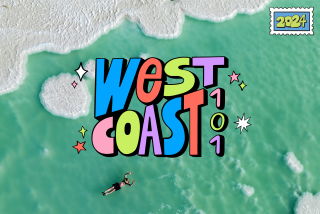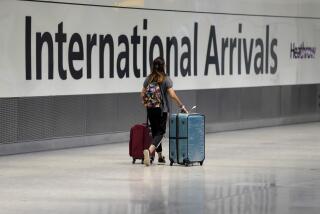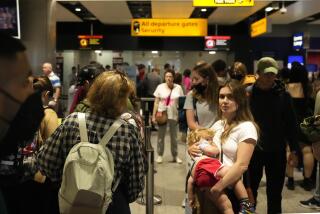America’s Travel IQ
- Share via
If you look at some American travel statistics you’re bound to be impressed.
Americans love to travel--we went on a record 1.2 billion trips last year. And we spent a record amount of money.
But how much do we really know about travel?
In recent weeks two nationwide surveys have tried to find out.
The results of the surveys are surprising, amusing, even disturbing. And they reveal some widely held misconceptions that Americans harbor about travel.
Earlier this year the National Geographic Society conducted an international study to determine how the United States compares to other countries in geographic literacy.
Americans ranked among the bottom third. Only Italy and Mexico scored lower.
Swedes in First Place
Adults in nine countries (including France, Japan, Sweden and the United Kingdom) were asked to locate 13 selected countries. The Swedes were first, averaging 11.6 places out of a possible 16.
Not only did the Americans score poorly but U.S. 18-to-24-year-olds taking the test performed abysmally, getting an average of only 6.9 places correct . . . worse than their counterparts in all other countries.
Of all adult Americans surveyed, 75% didn’t know where to find the Persian Gulf.
Fewer than half the Americans were able to identify the United Kingdom, France, South Africa or Japan. Only 25% were able to locate Sweden.
Other findings were more disturbing. Only half the adult Americans knew that the Sandinistas and Contras were fighting in Nicaragua. Many incorrectly placed the conflict in Iran and Lebanon; some put it in Afghanistan.
World’s Largest City?
Only 15% could name Mexico City as the world’s largest city.
Some of those surveyed actually believed that the Summer Olympics are to be held in Iraq. Most were unaware that South Korea is the host country. Others believe that pandas come primarily from Panama and that kangaroos are hopping in . . . Lebanon!
And what about common sense in travel?
Omni Hotels conducted a survey to try to determine America’s travel IQ.
Some results: Seven out of 10 Americans didn’t know the difference beteern a direct and a nonstop flight. About six out of 10 Americans are not sure whether they must pay travel agents a commission for their services. And nearly half think it is cheaper to drive an automobile than it is to take a plane to a destination.
The Omni survey also found that half of those questioned were unaware that many hotels offer the same rooms at cheaper rates on weekends. Eight out of 10 Americans didn’t know what a hotel concierge is or does. And nearly seven out of 10 Americans thought that a Supersaver fare allows for an overnight stay in a connecting city.
How many time zones does the United States span? Seven out of 10 Americans surveyed answered four. (The correct answer is six: Eastern, Central, Mountain, Pacific, Alaskan and Aleutian/Hawaii.)
Other questions asked:
True or false? The term “European Plan” means that meals are included in the hotel room rate? False. But nearly eight out of 10 Americans--77%--thought European Plan includes meals.
True or false? The economy section of the plane is at the rear of the plane, behind full-fare coach seats. False again. But about six out of 10 Americans believe it. Actually, economy is not a physical section of any plane, but a fare category.
The Omni survey also revealed what Americans do know about travel. For example, 83% knew that a new federal law prohibits smoking on domestic flights of two hours or less and 75% knew that many hotel chains offer frequent traveler/frequent stay programs.
About 67% knew that airlines have the legal right to give your seat away if you check in at the gate after the designated time.
And 64% were correct in identifying a major area of airline confusion--that you are not entitled to any compensation if an airline bumps you from a flight if it is able to get you to your destination within an hour of your original arrival time.
(If the delay is more than one hour you are entitled to “denied boarding compensation,” which is the equivalent to the one-way fare to the destination, but not more than $200. And if the delay is more than two hours, compensation must be doubled. Each airline may also offer bumped passengers a voucher for a free flight in lieu of the denied boarding compensation.)
Last, the Omni survey asked if Americans thought they needed a passport to travel to Mexico, Bermuda, the Bahamas, Puerto Rico, Toronto or Honolulu. The majority of Americans--60%--knew a passport was not required to travel to any of these destinations.
However, one out of 10 Americans surveyed believed a passport was required to visit Honolulu.
More to Read
Sign up for The Wild
We’ll help you find the best places to hike, bike and run, as well as the perfect silent spots for meditation and yoga.
You may occasionally receive promotional content from the Los Angeles Times.






